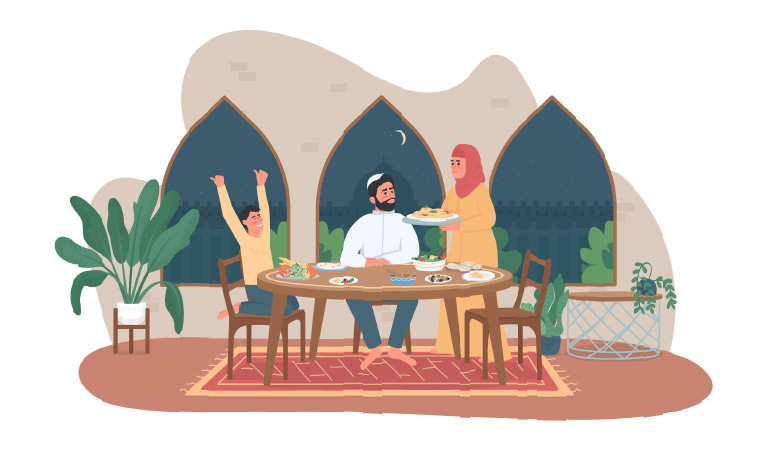

Diet on Ramadan: 7 Steps to Healthy Eating During Ramadan
The holy month of Ramadan is a special time of year for Muslims.This is a time when Muslims reflect on themselves, connect more profoundly with their religion, and give back to their community.
According to a study by National Center for Biotechnology Information (NCBI), Ramadan is a healthy diet way to overcome unhealthy eating habits, but the majority of people aren't taking advantage of its full potential. During Ramadan, it's vital to eat a well-balanced diet that gives you energy and helps to keep your fast going. In this blog, we share 7 steps to a healthy diet on Ramadan for you to consider.
Diet on Ramadan Step 1: Keep yourself hydrated.
Being hydrated is vital to be healthy and lower the risk of illnesses. To stay hydrated, drink at least two cups of water during suhoor. Water-rich foods like watermelon, cucumber, tomato, and other fruits and vegetables can be included in your pre-dawn meal. To ensure proper hydration throughout the day, drink two liters of water gently between iftar and suhoor.
Diet on Ramadan Step 2: Don’t skip suhoor(pre-dawn meal)
Breakfast, as the saying goes, is the most essential meal of the day. And it's much more vital during Ramadan! Although skipping suhoor to get more sleep may sound enticing, it is not recommended.
If you skip suhoor, your fast will be difficult because your body will have to rely on the last meal for all nutrients and energy until iftar. You are prone to feel dehydrated and exhausted during the day due to the long hours of fasting. In addition, ignoring Suhoor encourages binge eating during iftar, which can lead to unexpected weight gain.

Diet on Ramadan Step 3: Don’t overeat
Overeating when it's time to break your fast might be just as harmful to your body as skipping suhoor. Iftar should be a nutritious, well-balanced meal, not a feast! Overeating, particularly the consumption of high-fat foods, can cause indigestion and weight gain. Slow down and savor each bite of your meal.
Diet on Ramadan Step 4: Consume a lot of fruits and veggies.
At least 5 servings of fruits and vegetables should be included in your Ramadan food menu. They can be eaten raw in salads or cooked in soups and stews. Vitamins, minerals, and fibre are all key nutrients found in fruits and vegetables. They also make you feel satisfied without adding too many calories to your diet, which is ideal for weight loss. Every day, choose a variety of fruits and vegetables - eat the rainbow!
Diet on Ramadan Step 5: Limit your sweets
Many Ramadan snacks have high fat, sugar, and calorie content. Keep these goodies reserved for exceptional iftar celebrations or invitations, and avoid them on 'regular' evenings. Fresh fruits and refreshing fruit sorbets are a better alternative to decadent desserts.
Diet on Ramadan Step 6: Add proteins
Cheese, labneh, eggs, and beans are high in energy and help to stave off hunger throughout the day. Fish, lean beef, and white-meat fowl are all healthy choices if you choose the low-fat varieties. It may appear to be a bit heavy to have these at suhoor, but even a tiny quantity will help you get through your fast.
Diet on Ramadan Step 7: Avoid fried, sugary and salty iftar food items
When it comes to mealtime, it is not uncommon for fasting people to reward themselves with rich, oily, fried, and sugary dishes. While these foods make you feel wonderful in the short term, they can make fasting more challenging the next day.
Consuming fatty and sugary foods causes sluggishness and exhaustion in addition to the harmful weight increase. Additionally, you should restrict your salt intake, particularly during suhoor (the pre-dawn meal), because salt increases thirst.
Instead, include meals from all major dietary groups, such as fruits and vegetables, grains and alternatives, and meat and alternatives. Fibre-rich foods are especially beneficial during Ramadan since they are digested more slowly than processed foods, making you feel fuller for longer.
What are the benefits of Roza?
Fasting throughout Ramadan can help with sleep problems and other issues. It's also seen as a well-thought-out approach to lower the danger of some cancers. Fasting is an excellent technique to cleanse and detoxify the human body.
Healthy suhoor diet on Ramadan
Suhoor's nutrient-dense diet includes whole grains, brown rice, and carbs. Meat, milk, cheese, yogurt, and eggs are good things to eat in fast since they consistently raise blood sugar levels while keeping you satisfied. As drinking water during the day is prohibited, you can include fruits with high water content in your meal. Suhoor fruits must include watermelon, pineapple, mangoes, plums, and others. Salads and dried fruits are also good options.
Healthy iftar diet on Ramadan
A diet rich in complex carbohydrates, such as brown rice and whole-grain meals, as well as lean proteins, such as yogurt, fish, and poultry, is recommended for this meal, just as it is for suhoor. It's also crucial to drink enough water during this meal to meet your daily hydration needs. You can also hydrate yourself with freshly squeezed juices. It is best to avoid eating too many salty, spicy, or fried meals that make you thirsty.
Homeopathy for fasting
When you start fasting, which is when you stop eating and drinking for a while, your body requires time to acclimate to a new dietary pattern. This physiological adjustment causes not only a nauseous feeling, but also dizziness, headaches, poor breath, gas, and an irregular pulse.
Homeopathy treatments help you deal with the difficulties of fasting. Homeopathic remedies can aid healthy fasting by enhancing digestion and metabolism. Homeopathy boosts immunity on a deeper level. It helps to treat the root cause of recurrent side effects induced by fasting, rather than just giving symptomatic relief. It also prevents infections from recurring and provides long-term relief.
Why Dr Batra's®
Making the right dietary choices throughout Ramadan can make your fast as healthy as possible. At Dr Batra's®, a holistic approach is used to comprehend the individual's physical as well as emotional difficulties. Throughout the holy month of Ramadan, our skilled homeopathy doctors are available to provide you with the treatment and healthy diet on Ramadan you require.
Key Takeaways
- Ramadan is a special time for Muslims to reflect, connect with their faith, and help their community.
- A study suggests Ramadan can help break unhealthy eating habits, but many don't use its full benefits.
- Eating a balanced diet during Ramadan is important for energy and maintaining the fast.
- The blog offers 7 steps to follow a healthy diet during Ramadan.
- These steps aim to help people make the most of Ramadan's potential health benefits.

